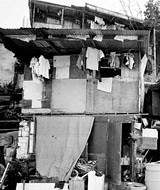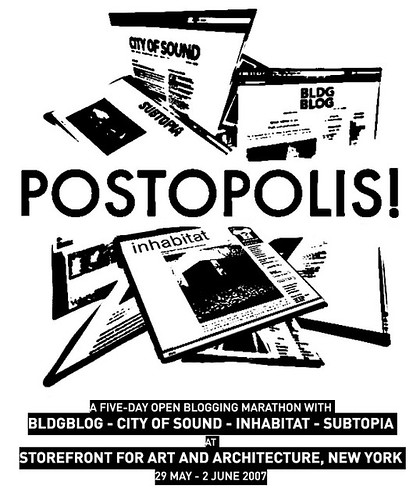Peripheral Milit_Urb 15

[Image: Cincu - Großschenk, Transylvania.]
RANDOM BITS ON THE MIDEAST & THE "WAR ON TERROR"
Democracy Now: New Iraq Oil Law To Open Iraq's Oil Reserves to Western Companies - "After a long negotiation process involving US officials, the Iraqi government is considering a new oil law that would establish a framework for managing the third-largest oil reserves in the world. What would this new law mean for Iraq?" Amy Goodman speaks with Raed Jarrar Iraq Project Director for Global Exchange. He is an Iraqi blogger and architect, and Antonia Juhasz, author and activist.
Also, in DemNow: The Iraq Effect: New Study Finds 600% Rise in Terrorism Since US Invasion of Iraq.

Pruned: The Hanging Cemetery of Babylon - "Nannette Jackowski and Ricardo O. C. de Ostos, both recently tasked to author the next installment of Pamphlet Architecture, once proposed “a gigantic presence of a hanging funeral structure” that will hover above the war torn streets of Baghdad, floating unceasingly “from bright explosive mornings to airless night hours,” and lush with growth from an endless supply of dead Iraqis."
On that tip, Bldgblog highlights "a skyscraping extension to the Memorial Necrópole Ecumênica, a vertical cemetery established in Santos in Brazil in 1983." Structures of the death market.
Washington Post: Iraq Rebuilding Short on Qualified Civilians - "The management of reconstruction projects in the province has been assigned to a Border Patrol commander with no reconstruction experience. The task of communicating with the embassy in Baghdad has been handed off to a man with no background in drafting diplomatic cables. The post of agriculture adviser has gone unfilled because the U.S. Department of Agriculture has provided just one of the six farming experts the State Department asked for a year ago."
Washinton Post: Inspector General Details Failures of Iraq Reconstruction - "The U.S. government was unprepared for the extensive nation-building required after it invaded Iraq, and at each juncture where it could have adjusted its efforts, it failed even to understand the problems it faced, according to the special inspector general for Iraq reconstruction." [Also, BBC: Reconstruction in Iraq criticised; NYT: Iraq Reconstruction Teams to Receive Needed Support; Danger Room: Reconstruction Surging, Too]
Planetizen: No Reliable Electricity in Baghdad Until 2013? - "Baghdad's mayor Sabir al-Isawi expresses frustration with American authorities over sluggish repairs to smashed infrastructure."
Iraqi Border Town Struggles With Violence, Drugs and Little Government Help: "The daily attacks in Iraq's cities often overshadow the problems in smaller towns. But as hundreds-of-thousands of Iraqis flee Baghdad and other major cities, small town officials face growing problems. VOA's Barry Newhouse recently visited the town of Khanaqin on Iraq's border with Iran, where local officials are trying to cope with sectarian violence, a stagnant economy, booming drug trafficking and a massive influx of new arrivals."

In Baghdad, a Flimsy Outpost: U.S. troops sleep after setting up a combat outpost, one of 100 slated for the capital, in an abandoned gym in western Baghdad. (By Ernesto Londono -- The Washington Post)
[8th Iraqi Army Division To Get Six New Garrison Buildings; and tangentially related: Bldgblog: Sleep Labs of the Soviet Empire]
Bouphonia: A Seller's Market - A good roundup of recent military contracts and weapons finding a new home in and around the Gulf.
Planetizen: Transforming Kandahar - "Despite ongoing conflict in Afghanistan, Kandahar's officials, residents and planners are envisioning a prosperous and sustainable future for the city."
OTHER MISCELLANY
Planetizen: War Fatalities Hurt Small Town America - "Small towns and rural areas hit by economic downturns have seen many of their young people enlist for lack of other opportunities -- and as a result they represent almost half of U.S. war fatalities in Iraq and Afghanistan."
AlterNet: In Defense of Mercenaries - A pretty interesting article on the infrastructure of the private mercenary industry and it's shadowy legitimacy in the U.S. warfare market. "From strategic weapons systems as the B-2 stealth bomber and Global Hawk to running ROTC programs, the military has been colonized by corporations. This is all legitimate business created by our own government." But, entrenched to such an extent in the darkness of lacking oversight, even members of the PMC (private military contractors) community themselves are begining to urge greater regulation.

A photoset for the BBC by photographer Yoav Galai covers some of the tension and protest in Jerusalem as the Israeli government excavates along side the Temple Mount, or Haram al-Sharif, considered the most important religious site in Jerusalem. "Its Western Wall is the holiest site in Judaism. The mount is holy to Jews because it was the site of the First and Second Temple in ancient times. The compound also houses the Dome of the Rock, pictured here, and the al-Aqsa mosque, the third holiest site in Islam." [...] "The status of these sites and control over them is one of the most sensitive issues in the Middle East conflict. The start of Israeli excavations at the Mugrabi Gate, a preliminary to repairs to a walkway up to the compound, enraged Muslims around the world. Palestinian leaders say the work threatens Islamic archaeological remains and see the work as a huge provocation. Israel insists that the work poses no risk to the holy site." [Also: Israeli Politics of 'Archeology' in Jerusalem]
ConflictWiki.org is an open source and independent wiki providing cross-cultural (institutionally speaking) information. The target communities include, but isn't restricted to, those studying counterinsurgency, counterterrorism, intelligence, private military companies, private intelligence companies, peacekeeping and peacemaking, and public diplomacy. ConflictWiki will be the clearing house for information for conflicts from wars to low-intensity or terrorist operations. The actors in these conflicts, whether they are state or non-state, will be captured here, like lists of militias, terrorist groups, and criminal gangs.

Boing Boing: Red Cross chapter installs fearmongering terror billboards. Apparently, they are popping up all over the place. Check these out.

Then, there was this stunt in San Francisco.

Xeni Jardin takes on a little tour of One Wishire in Downtown Los Angeles - "If the Internet is a superhighway, One Wilshire is a really popular roadside hotel. It's a 30-story building, and once exclusively housed law offices. CRG West manages the property, and they're the tech real estate branch of the Carlyle Group. David Dunn of CRG West says 23 of the building's floors are now designed to house not people, but some of the most important communications infrastructure in the country."

BBC: Lasers could one day be used to destroy rockets, mortars, or roadside bombs - "A laser developed for military use is a few steps away from hitting a power threshold thought necessary to turn it into a battlefield weapon." The image above is a possible design for a mobile labratory that could deploy the the Solid State Heat Capacity Laser (SSHCL)in the field.
CityStates: Portage & Main: Barriers More than Concrete - "Owing to a massive redevelopment project in 1976, all pedestrian traffic was diverted into an underground mall known as Winnipeg Square, and since then street traffic has been able to negotiate the wide turns without waiting for people to get out of the way. Meanwhile, people in the underground tunnels face what must surely be one of the country's most frustrating wayfinding challenges -- attempting to select the proper stairs to lead to the desired intersection. Once topside, of course, anyone wanting to visit the intersection on foot must remain behind concrete barriers -- visible in the photo below:"
Phronesisacial: Fear and the Physical Environment: Helmut writes in regards to Ourrossouff's recent NYT article: "We have, after all, fetishized fear. It runs our foreign policy; it runs our domestic social policy. When fear becomes this natural, it's a surprise that we can continue to see the fortresses of our daily life at all. Does it matter that we're turning the aesthetic of our lived environment into simply a function of utility and security to this extent? Yes. Because it is a reflection of who we increasingly are and who we are increasingly has little to do with the actual nature of threats, the existence of threats, and intelligent responses to them, and more to do with a realm of fantasy in which we believe erroneously that everyone wants what we have and envies us for it. They want to destroy us and our self-satisfied symbols of freedom and prosperity. We must protect it. But what, precisely, is the it that we are so desperate to protect? I'm not so sure we have any idea."
Architecture of Fear: Severe, High, Elevated, Guarded or Low? - A good review of the book “5 Codes; Architecture, Paranoia and Risk in Times of Terror”

STITCH FOR SENATE: "Stitch for Senate is an initiative of knit hobbyists making helmet liners for every United States Senator. The helmet liner pattern was adapted from a support-the-troops initiative for soldiers stationed in Iraq. All the senators will receive their own helmet liner, and Senators can opt to send helmet liners to a soldier once they receive the helmet. Charitable knitting during wartime has been a tradition since the American Revolution and this charitable knitting project focuses on supporting the troops by encouraging senators to bring the troops home. The Stitch for Senate website will compile testimonies from knitters reviving this cultural trend, seeking to understand what knitters express through wartime knitting: charity, allegiance, patriotism, resistance, radicalism, etc. and use the tradition of political organizing within knitting circles as a space for storytelling, discussion, exchange and protest."

Roland Piquepaille: The impact of nuclear attacks on U.S. cities: "Researchers from the Center for Mass Destruction Defense (CMADD) at the University of Georgia have created a detailed simulation of the catastrophic impact a nuclear attack would have on American cities. They've looked at the detailed consequences that such attacks would have on four cities, Atlanta, Chicago, New York and Washington, D.C., and concluded that the destruction of the major hospitals in the downtown areas of the four cities would be almost nearly complete. They've estimated the numbers of direct deaths from the blasts and indirect ones from burns and radiations. They also give some solutions to reduce the number of lost lives, which could reach 5 million for the New York City area. Frightening..."
[Earlier peripherals ... 1 2 3 4 5 6 7 8 9 10 11 12 13 14]







0 Comments:
Post a Comment
<< Home